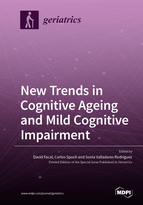New Trends in Cognitive Ageing and Mild Cognitive Impairment
A special issue of Geriatrics (ISSN 2308-3417).
Deadline for manuscript submissions: closed (30 November 2021) | Viewed by 28648
Special Issue Editors
Interests: longitudinal process of cognitive aging; early signs of cognitive impairment; mild cognitive impairment and mild dementia; the role of cognitive reserve in early manifestation of the disease; the development computerized cognitive interventions to prevent dementia and other age-related diseases
Special Issues, Collections and Topics in MDPI journals
2. CIBERSAM, Madrid, Spain
Interests: dementia; nutrition; physical activity; biomarkers; depression; schizophrenia; bipolar disorders; role of immune system and central nervous system
Interests: current research is focussing in the application of machine learning techniques to detect Mild Cognitive Impairment and Alzheimer's Disease in an early stage. Moreover, in the development of tech-solutions (e.g., serious games, computerized tools, smart conversational agents, etc.), to both cognitive assessment and cognitive interventions, in order to prevent dementia and other age-related diseases, from an ecological and non-intrusive perspective.
Special Issues, Collections and Topics in MDPI journals
Special Issue Information
Dear Colleagues,
During the last 20 years, the increase in cognitive impairment associated with mental pathologies, the aging of the population, and the increase in dementias have had a great social and health impact.
As a result of the global pandemic caused by the severe acute respiratory syndrome coronavirus 2 (SARS-CoV2), it is expected that in the coming years we will have a pandemic linked to mental health problems such as depression and anxiety disorders and an increase in the number of suicides. Other problems posed by coronavirus disease 2019 (COVID-19) are associated with quarantine social distancing measures, which cause difficulties in the treatment of patients with dementia, worsening their cognitive impairment and general health.
In this context, early interventions and preventive approaches are gaining relevance, including cognitive training and cognitive stimulation, physical exercise, healthy nutritional practices, as well as technological interventions based on video games, clocks, communication aids, monitoring of electrical appliance use and GPS location, tracking devices, homecare robots, home monitoring devices or medication management.
This second Special Issue of Geriatrics will focus on current advances in the study of cognitive aging and risk factors for age-related cognitive decline, with special emphasis on preventive interventions and problems associated with COVID-19 and the post-COVID-19 era. It will provide an opportunity to publish research articles related to this important field of research. Publication is free of charge. We encourage you and your colleagues to submit your papers for publication in this Special Issue.
Prof. Dr. David Facal
Dr. Carlos Spuch
Dr. Sonia Valladares Rodriguez
Guest Editors
Manuscript Submission Information
Manuscripts should be submitted online at www.mdpi.com by registering and logging in to this website. Once you are registered, click here to go to the submission form. Manuscripts can be submitted until the deadline. All submissions that pass pre-check are peer-reviewed. Accepted papers will be published continuously in the journal (as soon as accepted) and will be listed together on the special issue website. Research articles, review articles as well as short communications are invited. For planned papers, a title and short abstract (about 100 words) can be sent to the Editorial Office for announcement on this website.
Submitted manuscripts should not have been published previously, nor be under consideration for publication elsewhere (except conference proceedings papers). All manuscripts are thoroughly refereed through a single-blind peer-review process. A guide for authors and other relevant information for submission of manuscripts is available on the Instructions for Authors page. Geriatrics is an international peer-reviewed open access semimonthly journal published by MDPI.
Please visit the Instructions for Authors page before submitting a manuscript. The Article Processing Charge (APC) for publication in this open access journal is 1800 CHF (Swiss Francs). Submitted papers should be well formatted and use good English. Authors may use MDPI's English editing service prior to publication or during author revisions.
Keywords
- cognitive function
- cognitive aging
- mild cognitive impairment and dementia
- COVID-19 and cognitive decline
- social distancing
- cognitive frailty
- physical frailty
- cognitive reserve
- cognitive training
- cognitive stimulation
- cognitive rehabilitation
- nutrition
- physical activity
- biomarkers
- preventive interventions
- assistive technologies
Related Special Issue
- Cognitive Aging and Cognitive Impairment in Geriatrics (15 articles)









